非谓语作补语
- 格式:doc
- 大小:578.50 KB
- 文档页数:3
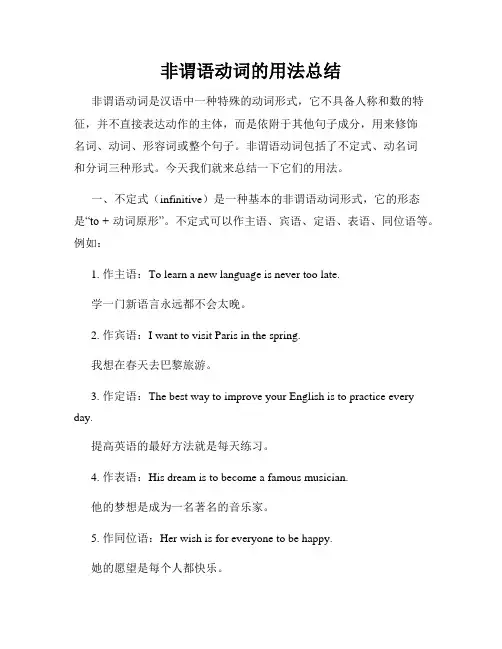
非谓语动词的用法总结非谓语动词是汉语中一种特殊的动词形式,它不具备人称和数的特征,并不直接表达动作的主体,而是依附于其他句子成分,用来修饰名词、动词、形容词或整个句子。
非谓语动词包括了不定式、动名词和分词三种形式。
今天我们就来总结一下它们的用法。
一、不定式(infinitive)是一种基本的非谓语动词形式,它的形态是“to + 动词原形”。
不定式可以作主语、宾语、定语、表语、同位语等。
例如:1. 作主语:To learn a new language is never too late.学一门新语言永远都不会太晚。
2. 作宾语:I want to visit Paris in the spring.我想在春天去巴黎旅游。
3. 作定语:The best way to improve your English is to practice every day.提高英语的最好方法就是每天练习。
4. 作表语:His dream is to become a famous musician.他的梦想是成为一名著名的音乐家。
5. 作同位语:Her wish is for everyone to be happy.她的愿望是每个人都快乐。
二、动名词(gerund)是名词化的动词,它的形态是动词的现在分词形式(V-ing),可以作主语、宾语、定语、表语等。
例如:1. 作主语:Swimming is good for your health.游泳对身体健康有好处。
2. 作宾语:He enjoys playing basketball in his free time.他喜欢在空闲时间打篮球。
3. 作定语:I have a meeting with my boss this afternoon.我今天下午有个与老板的会议。
4. 作表语:Her favorite activity is dancing.她最喜欢的活动是跳舞。
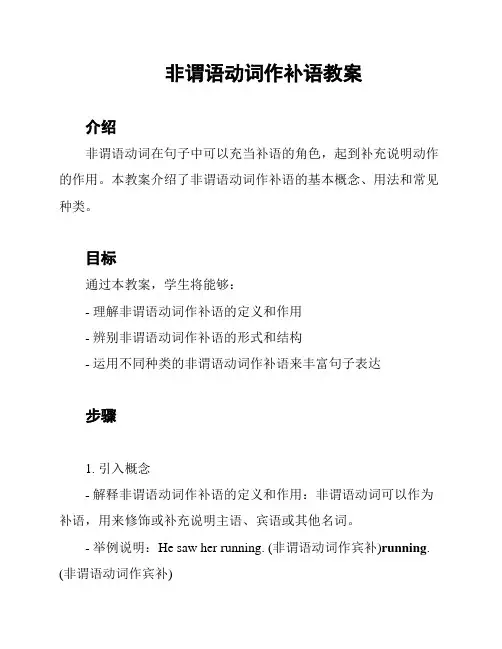
非谓语动词作补语教案介绍非谓语动词在句子中可以充当补语的角色,起到补充说明动作的作用。
本教案介绍了非谓语动词作补语的基本概念、用法和常见种类。
目标通过本教案,学生将能够:- 理解非谓语动词作补语的定义和作用- 辨别非谓语动词作补语的形式和结构- 运用不同种类的非谓语动词作补语来丰富句子表达步骤1. 引入概念- 解释非谓语动词作补语的定义和作用:非谓语动词可以作为补语,用来修饰或补充说明主语、宾语或其他名词。
- 举例说明:He saw her running. (非谓语动词作宾补)running. (非谓语动词作宾补)2. 非谓语动词作补语的形式- 动词不定式:to + 原形动词(e.g. to run)- 分词:现在分词 (-ing) 和过去分词 (-ed, -en, 等)- 不定式短语:不定式与宾语或其他成分构成短语- 举例说明:She was glad to help. (不定式作宾补)to help. (不定式作宾补)3. 非谓语动词作补语的结构- 作宾补:非谓语动词紧跟在及物动词的后面,作为宾语的补充。
- 作主补:非谓语动词后接名词或代词,充当主语的补充。
- 作表补:非谓语动词后接名词或代词,用来修饰主语或宾语。
- 举例说明:She made him laugh. (不定式作宾补)laugh. (不定式作宾补)4. 练- 给学生提供一些句子,让他们根据所学知识确定非谓语动词作补语的种类和角色。
- 学生互相交换句子,并互相修改以增加非谓语动词作补语来丰富句子表达。
5. 总结- 复非谓语动词作补语的基本概念、形式和结构。
- 强调非谓语动词作补语在句子中的重要作用。
- 鼓励学生在写作或口语中灵活运用非谓语动词作补语,提高表达的准确性和多样性。
扩展练- 让学生自主创作几个句子,使用不同种类的非谓语动词作补语来丰富句子表达。
- 分组讨论,提供一个话题,让学生以小组形式编写短片剧本或故事情节,要求其中使用非谓语动词作补语来提高句子的表达能力。
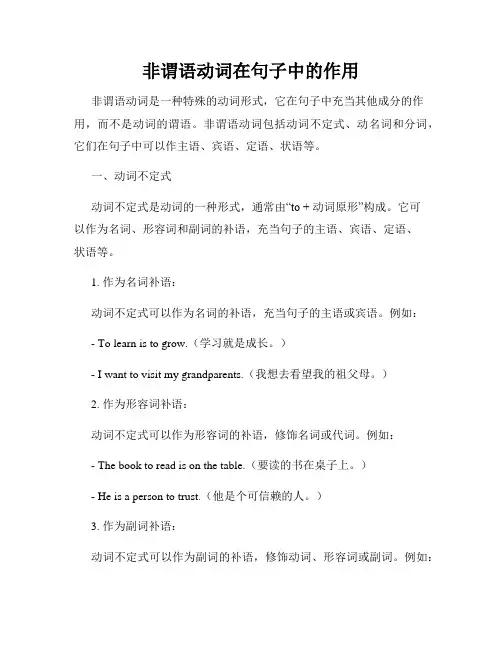
非谓语动词在句子中的作用非谓语动词是一种特殊的动词形式,它在句子中充当其他成分的作用,而不是动词的谓语。
非谓语动词包括动词不定式、动名词和分词,它们在句子中可以作主语、宾语、定语、状语等。
一、动词不定式动词不定式是动词的一种形式,通常由“to + 动词原形”构成。
它可以作为名词、形容词和副词的补语,充当句子的主语、宾语、定语、状语等。
1. 作为名词补语:动词不定式可以作为名词的补语,充当句子的主语或宾语。
例如:- To learn is to grow.(学习就是成长。
)- I want to visit my grandparents.(我想去看望我的祖父母。
)2. 作为形容词补语:动词不定式可以作为形容词的补语,修饰名词或代词。
例如:- The book to read is on the table.(要读的书在桌子上。
)- He is a person to trust.(他是个可信赖的人。
)3. 作为副词补语:动词不定式可以作为副词的补语,修饰动词、形容词或副词。
例如:- He worked hard to pass the exam.(他努力学习以通过考试。
)- She is too excited to sleep.(她太兴奋以至于无法入睡。
)二、动名词动名词是动词的一种形式,以-ing结尾。
它可以充当名词的角色,在句子中可以作主语、宾语、定语、状语等。
1. 作为名词主语:动名词可以作为句子的主语,表示一个行为或状态。
例如:- Singing brings me joy.(唱歌给我带来快乐。
)- Swimming is good for your health.(游泳对健康有好处。
)2. 作为名词宾语:动名词可以作为句子的宾语,接在及物动词后面。
例如:- I enjoy reading books.(我喜欢读书。
)- She hates doing household chores.(她讨厌做家务。
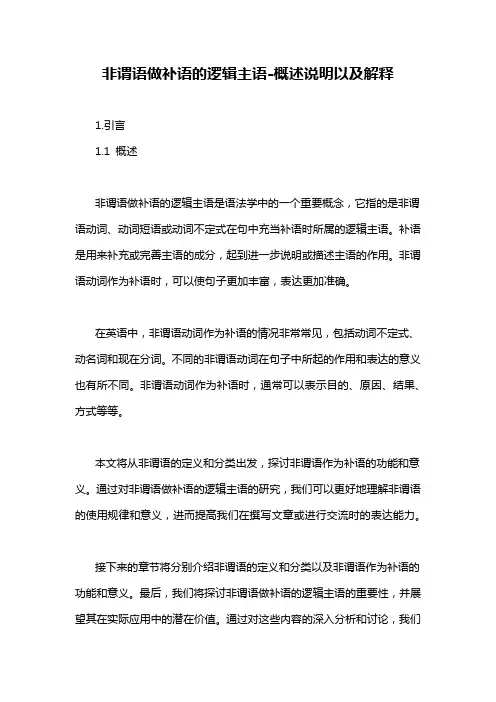
非谓语做补语的逻辑主语-概述说明以及解释1.引言1.1 概述非谓语做补语的逻辑主语是语法学中的一个重要概念,它指的是非谓语动词、动词短语或动词不定式在句中充当补语时所属的逻辑主语。
补语是用来补充或完善主语的成分,起到进一步说明或描述主语的作用。
非谓语动词作为补语时,可以使句子更加丰富,表达更加准确。
在英语中,非谓语动词作为补语的情况非常常见,包括动词不定式、动名词和现在分词。
不同的非谓语动词在句子中所起的作用和表达的意义也有所不同。
非谓语动词作为补语时,通常可以表示目的、原因、结果、方式等等。
本文将从非谓语的定义和分类出发,探讨非谓语作为补语的功能和意义。
通过对非谓语做补语的逻辑主语的研究,我们可以更好地理解非谓语的使用规律和意义,进而提高我们在撰写文章或进行交流时的表达能力。
接下来的章节将分别介绍非谓语的定义和分类以及非谓语作为补语的功能和意义。
最后,我们将探讨非谓语做补语的逻辑主语的重要性,并展望其在实际应用中的潜在价值。
通过对这些内容的深入分析和讨论,我们可以更好地理解和应用非谓语做补语的逻辑主语,为我们的写作和表达提供更多可能性。
1.2文章结构文章结构部分可以包括以下内容:文章结构是指文章的组织结构和布局,它对于读者来说非常重要。
一个好的结构能够使文章的内容更加清晰、连贯和易于理解。
在本文中,我们将介绍一下文章的结构。
在本文中,我们将按照以下结构来组织文章内容:第一部分:引言在引言部分,我们将对本文的主题进行概述,包括非谓语做补语的逻辑主语的定义和作用。
我们还将介绍本文的文章结构和目的。
第二部分:正文在正文部分,我们将详细介绍非谓语的定义和分类。
我们将讨论何为非谓语,以及非谓语的分类,包括动词不定式、分词和动名词等。
我们还将探讨非谓语作为补语的功能和意义,包括强调、修饰和补充主语、宾语或其他成分等。
第三部分:结论在结论部分,我们将强调非谓语做补语的逻辑主语的重要性,包括它对于句子结构的影响和在语言表达中的作用。
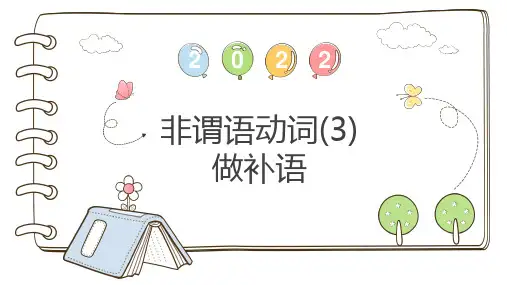
特警名言句子1. 特警力量中的一些名言警句1.奇迹,是留给那些坚持不放弃的人的!2.他沈鸿飞比段卫兵要冷静的多,他知道自己不能成为异类。
一个团队不是每个人的选择都是正确的,他在照顾整个团队的情绪。
!所以,他沈鸿飞,是整个团队的领导者!3.哪有那么多去对的地方,既然来了,就什么都不要想!4.那个时候,我们都太年轻,太骄傲,不懂得欣赏对方的好!5.我们会带着他们的生命,去战斗,去牺牲,绝不后退!6.遇到你这么个搭档,真是我的冤家。
7.真帅啊花痴!8.不要爱上突击队员。
9.当一个城市发生最危险案件的时候,需要的是我们特警! 10.我们是这个城市,最后一道屏障。
11.这个队将会是突击队当中的突击队,精锐当中的精锐。
12.我要去特警队,我想当特警。
13.我时时刻刻准备着,从小就准备着。
14.在荣誉墙上,有太多我认识的名字,我不希望你们是下一个。
15.真正的特警,特别能吃苦,特别能战斗,特别能忍耐,特别能奉献。
16.你们会退却吗永不退却!17.那时候我们都太年轻,太骄傲。
18.等你把莎莎救出来的时候,我会说谢谢你。
19.莎莎的命就是我的命。
20.最危险的时候,我们一家人要在一起2. 三十条警察名言警句001业精于勤,荒于嬉,行成于思,毁于随002黑发不知勤学早,白首方悔读书迟003吾生也有涯,而知也无涯004 日子象念珠一样,一天接着一天滑过,串成周,串成月005 年华一去不复返,事业放弃在难成006 黄金时代是在我们的前面,而不在我们的后面007 时间是脑力劳动者的资本008 文学之知识乃是学问之门禁009 天才无非是长久的忍耐,努力吧!010 知识象烛光,能照亮一个人,也能照亮无数人011 读万卷书,行万里路012 知识永远战胜愚昧013 黑发不知勤学早,白首方悔读书迟014 如果不想在世界上虚度一生,那就要学习一辈子015 书籍是横渡时间大海的航船016 一分耕耘,一分收获;要收获的好,必须耕耘的好017 学问二字,须要拆开看,学是学,问是问018 光阴易逝,岂容我待019 人生有一道难题,那就是如何使一寸光阴等于一寸生命020 忘记今天的人将被明天忘记021 你若需要时间,还得自己把他造出来022 时间是没有声音的锉刀023 时间是一味能治百病的良药024 人若是把一生的光阴虚度,便是抛下黄金未买一物025 时间是一笔贷款,即使在守信用的借贷者也还不起026 庸人费心将是消磨时光,能人费尽心计利用时间027 不要为已消逝之年华叹息,须正视欲匆匆溜走的时光028 向今天献出自己的人,没有哪一个昨天是给浪费掉的029 对活者的人来说,是没有明天的;死了的人则没有今天030 抓住今天,尽可能少的信赖明天031 岁月是百代的过客,而逝去的年华也是旅客032 对时间的价值没有没有深切认识的人,决不会坚韧勤勉033 除了时间,什么也不属于我034 浪费时间是一桩大罪过035 把握时间观念,同认识一个人一样,相见易,相识难036 人生最大的幸福,莫过于连一分钟都无法休息037 零碎的时间实在可以成就大事业038 浪费了一生就等于夭折039 珍惜时间可以使生命变的更有价值040 时间象奔腾澎湃的急湍,它一去无返,毫不流连041 一个人越知道时间的价值,就越感到失时的痛苦042 得到时间,就是得到一切043 用经济学的眼光来看,时间就是一种财富044 时间一点一滴凋谢,犹如蜡烛漫漫燃尽045 我总是感觉到时间的巨轮在我背后奔驰,日益迫近046 夜晚给老人带来平静,给年轻人带来希望047 不浪费时间,每时每刻都做些有用的事,戒掉一切不必要的行为048 时间乃是万物中最宝贵的东西,但如果浪费了,那就是最大的浪费049 我的产业多么美,多么广,多么宽,时间是我的财产,我的田地是时间050 时间就是性命,无端的空耗别人的时间,其实无异于谋财害命3. 关于警察的名言1、不要过分相信除你之外的任何人。
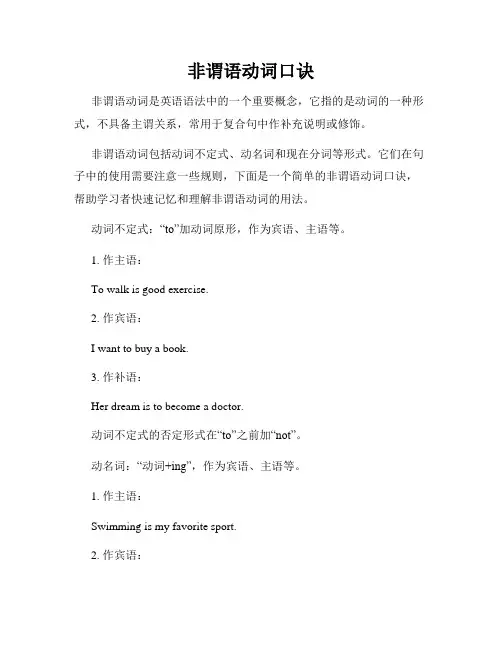
非谓语动词口诀非谓语动词是英语语法中的一个重要概念,它指的是动词的一种形式,不具备主谓关系,常用于复合句中作补充说明或修饰。
非谓语动词包括动词不定式、动名词和现在分词等形式。
它们在句子中的使用需要注意一些规则,下面是一个简单的非谓语动词口诀,帮助学习者快速记忆和理解非谓语动词的用法。
动词不定式:“to”加动词原形,作为宾语、主语等。
1. 作主语:To walk is good exercise.2. 作宾语:I want to buy a book.3. 作补语:Her dream is to become a doctor.动词不定式的否定形式在“to”之前加“not”。
动名词:“动词+ing”,作为宾语、主语等。
1. 作主语:Swimming is my favorite sport.2. 作宾语:I enjoy reading novels.3. 作介词宾语:She is good at cooking.4. 作定语:I have a running nose.动名词的否定形式在动词后加“not”。
现在分词:“动词+ing”,作为宾语、定语等。
1. 作宾语:She likes playing the piano.2. 作定语:The book on the table is interesting.3. 作状语:Smiling, he left the room.现在分词的否定形式在动词后加“not”。
以上是关于非谓语动词的一些常见用法,通过记忆这个简单的口诀,可以帮助学习者更好地理解和运用非谓语动词。
掌握了非谓语动词的用法,可以让我们的英语表达更加准确和流利。
希望这个口诀对大家的学习有所帮助!总结:动词不定式:to加动词原形动名词:动词+ing现在分词:动词+ing。
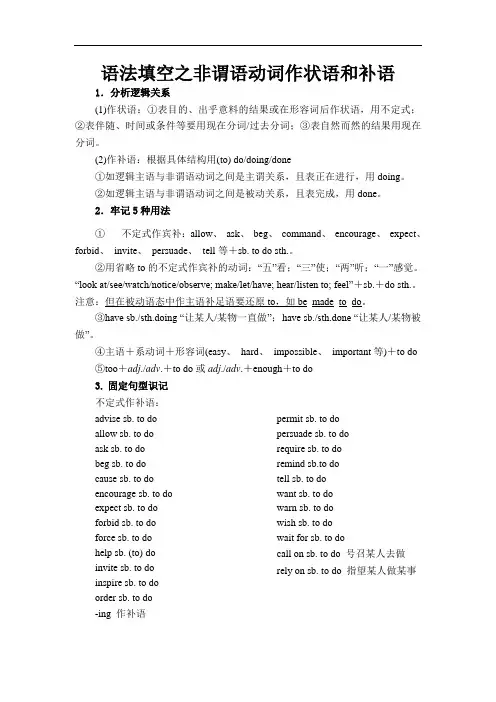
语法填空之非谓语动词作状语和补语1.分析逻辑关系(1)作状语:①表目的、出乎意料的结果或在形容词后作状语,用不定式;②表伴随、时间或条件等要用现在分词/过去分词;③表自然而然的结果用现在分词。
(2)作补语:根据具体结构用(to) do/doing/done①如逻辑主语与非谓语动词之间是主谓关系,且表正在进行,用doing。
②如逻辑主语与非谓语动词之间是被动关系,且表完成,用done。
2.牢记5种用法①不定式作宾补:allow、ask、beg、command、encourage、expect、forbid、invite、persuade、tell等+sb. to do sth.。
②用省略to的不定式作宾补的动词:“五”看;“三”使;“两”听;“一”感觉。
“look at/see/watch/notice/observe; make/let/have; hear/listen to; feel”+sb.+do sth.。
注意:但在被动语态中作主语补足语要还原to,如be_made_to_do。
③have sb./sth.doing “让某人/某物一直做”;have sb./sth.done “让某人/某物被做”。
④主语+系动词+形容词(easy、hard、impossible、important等)+to do⑤too+adj./adv.+to do或adj./adv.+enough+to do3.固定句型识记不定式作补语:advise sb. to do allow sb. to do ask sb. to dobeg sb. to do cause sb. to do encourage sb. to do expect sb. to do forbid sb. to do force sb. to do help sb. (to) do invite sb. to do inspire sb. to do order sb. to do permit sb. to dopersuade sb. to dorequire sb. to doremind sb.to dotell sb. to dowant sb. to dowarn sb. to dowish sb. to dowait for sb. to docall on sb. to do 号召某人去做rely on sb. to do 指望某人做某事-ing 作补语catch sb. doing 发现、撞见某人做某事find sb. doing 发现某人做某事keep sb./sth. doing 使...处于...状态leave sb./sth doing 使...处于...状态课堂练习1.On the last day of our week-long stay, we were invited to attend a private concert on a beautiful farm on the North Shore under the stars, ________ (listen) to musicians and meeting interesting locals.2.You don't have to run fast or for long________ (see) the benefit.3.The government encourages farmers to grow corn instead of rice________ (improve) water quality.4.Once his message was delivered, he allowed me________ (stay) and watch. 5.They are required________ (process) the food that we eat, to recover from injury and for several other bodily functions.6.Nervously ________ (face) challenges, I know I will whisper to myself the two simple words “Be yourself”.7 ________ (enjoy)the convenience of digital payment, many senior citizens started to use smart phones.8.Ordinary soap,________ (use) correctly, can deal with bacteria effectively. 9.I need a new passport so I will have to have my photographs________ (take).10.People probably cooked their food in large pots, ________ (use) twigs (树枝) to remove it.课后练习Gabi Rizea only discovered his talent for woodcarving three years ago,and has since put 1to good use,saving dozens of old tree stumps (树桩) from 2 (remove) by turning them into impressive works of art.Rizea became a woodcarver 3(complete) by accident.Three years ago,after buying himself a new chainsaw(链锯),he 4(start) “playing” with it on a block of wood.He tried carving a human face into the wood,and to his surprise,it turned out pretty good.Today,he is so good at woodcarving that his home city allows him to workhis magic on old tree stumps and so far about 40 works of art 5(create) in the local parks.“In 99% of the cases,the wood just doesn’t match my ideas,” he said in an interview.“I first have to remove all the rotten parts,and sometimes,6is left isn’t enough for my designs.”Following his recent rise to fame,Rizea has been asked by many 7 (city),including the capital of Romania to transform their old tree trunks 8 works of art.He promises to honor their requests,but he will never repeat any of the artworks 9(find) in his home city.In spite of his obvious talent,the Romanian 10(art) recently got into an art school in order to fully master woodcarving.参考答案:1.it 2.being pletely4.started5.have been created6.what7.cities8.into9.found10.artist课后练习(二)How would you feel if you woke up and found your information in the computer—including your photos,your recent documents—no longer 1 (access)?What if you found out that they had been wiped from your computer, 2 (leave) you with nothing but heartache?Guess what?It happens to people every single day.Every day,people across the country head into their local Apple store in 3(tear),broken computer in hand,praying as they wait in line 4an expensive repair might,just might,recover the priceless,irreplaceable files.A few get lucky. 5for the rest,there’s nothing anyone can do 6(help).Hasn’t it happened to you?If your computer remains unprotected,it will,and it’s only 7matter of time.But thanks to recent breakthroughs in computer backup(备份) technology,you now have a number of options to choose from,and if you’re smart,when your computer 8(crash),you shouldn’t have any trouble 9(get) 100% of your files back that same day.I’m not talking about an external hard drive.I’m talking about an online backup solution that runs 10(quiet) inthe background on your computer.If you have one installed (安装),when your computer crashes,you’ll be just one click away from bringing your files back to life.参考答案:1.accessible2.leaving3.tears4.that5.But6.to help7.a8.crashes9.getting10.quietly。
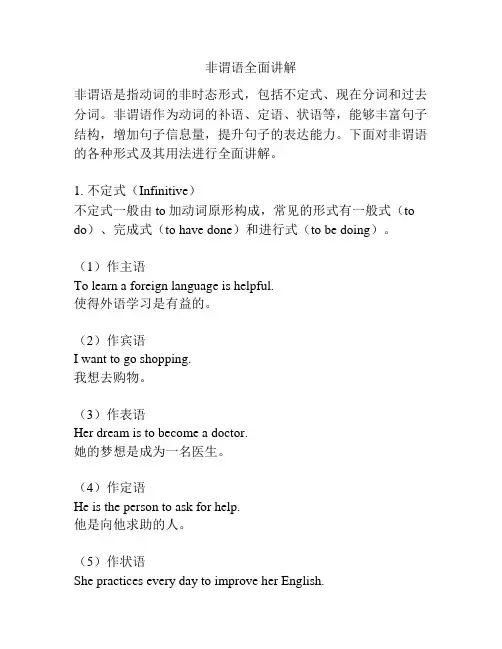
非谓语全面讲解非谓语是指动词的非时态形式,包括不定式、现在分词和过去分词。
非谓语作为动词的补语、定语、状语等,能够丰富句子结构,增加句子信息量,提升句子的表达能力。
下面对非谓语的各种形式及其用法进行全面讲解。
1. 不定式(Infinitive)不定式一般由to加动词原形构成,常见的形式有一般式(to do)、完成式(to have done)和进行式(to be doing)。
(1)作主语To learn a foreign language is helpful.使得外语学习是有益的。
(2)作宾语I want to go shopping.我想去购物。
(3)作表语Her dream is to become a doctor.她的梦想是成为一名医生。
(4)作定语He is the person to ask for help.他是向他求助的人。
(5)作状语She practices every day to improve her English.她每天练习以提高自己的英语。
2. 现在分词(Present Participle)现在分词是动词的进行式形式,一般以-ing结尾。
(1)作定语The running water is very clear.流动的水很清澈。
(2)作状语Walking along the street, I found a lost cat.我在街上走的时候,发现了一只走失的猫。
(3)作补语I saw him standing in the corner.我看见他站在角落里。
3. 过去分词(Past Participle)过去分词是及物动词的过去分词形式或系动词be的过去分词形式,通常以-ed结尾或者是不规则变化的形式。
(1)作定语The broken window needs to be repaired.需要修理那扇破窗户。
(2)作状语They arrived at the airport, tired and hungry.他们到达机场时,又累又饿。
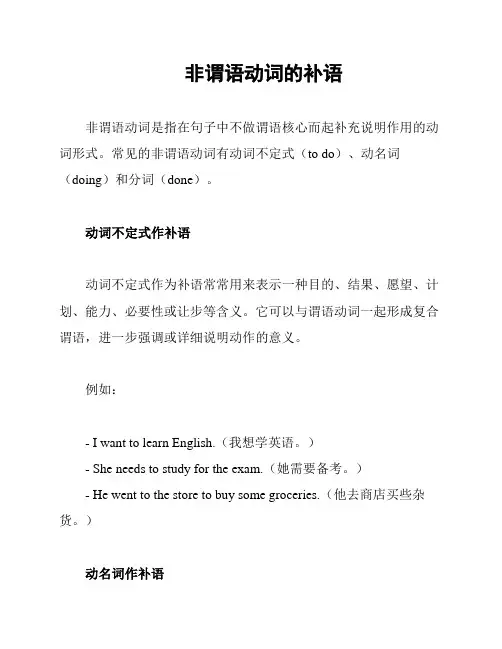
非谓语动词的补语非谓语动词是指在句子中不做谓语核心而起补充说明作用的动词形式。
常见的非谓语动词有动词不定式(to do)、动名词(doing)和分词(done)。
动词不定式作补语动词不定式作为补语常常用来表示一种目的、结果、愿望、计划、能力、必要性或让步等含义。
它可以与谓语动词一起形成复合谓语,进一步强调或详细说明动作的意义。
例如:- I want to learn English.(我想学英语。
)- She needs to study for the exam.(她需要备考。
)- He went to the store to buy some groceries.(他去商店买些杂货。
)动名词作补语动名词作为补语常常用来表示动作或状态的延续、目的、原因、结果、原因等含义。
它可以与谓语动词一起形成复合谓语,进一步强调或详细说明动作的意义。
例如:- I enjoy swimming in the ocean.(我喜欢在海里游泳。
)- They had trouble finding a hotel.(他们找不到酒店。
)- The professor talked about the importance of studying.(教授谈到了研究的重要性。
)分词作补语分词作为补语常常用来表示动作的完成、进行、被动或原因等含义。
它可以与谓语动词一起形成复合谓语,进一步强调或详细说明动作的意义。
例如:- She was excited to see her favorite singer perform.(她很兴奋地看到了她最喜欢的歌手表演。
)- The broken window needs to be repaired.(破损的窗户需要修理。
)- The children sat at the table, eating their dinner.(孩子们坐在桌子旁边,吃着晚餐。
)以上是关于非谓语动词的补语的简要介绍。
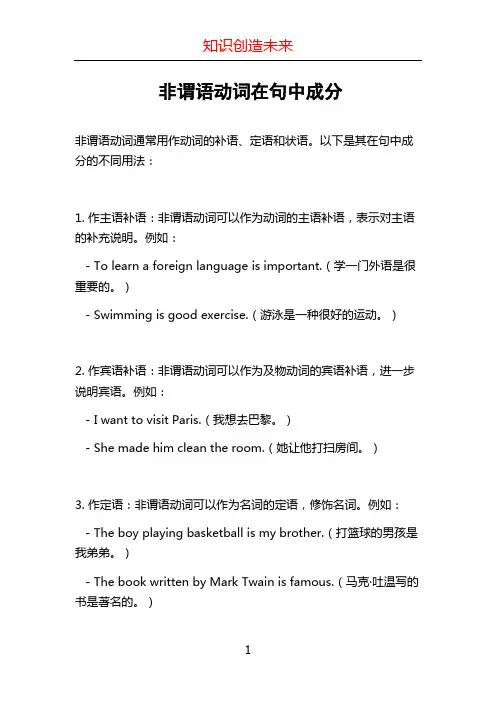
非谓语动词在句中成分
非谓语动词通常用作动词的补语、定语和状语。
以下是其在句中成分的不同用法:
1. 作主语补语:非谓语动词可以作为动词的主语补语,表示对主语的补充说明。
例如:
- To learn a foreign language is important.(学一门外语是很重要的。
)
- Swimming is good exercise.(游泳是一种很好的运动。
)
2. 作宾语补语:非谓语动词可以作为及物动词的宾语补语,进一步说明宾语。
例如:
- I want to visit Paris.(我想去巴黎。
)
- She made him clean the room.(她让他打扫房间。
)
3. 作定语:非谓语动词可以作为名词的定语,修饰名词。
例如:
- The boy playing basketball is my brother.(打篮球的男孩是我弟弟。
)
- The book written by Mark Twain is famous.(马克·吐温写的书是著名的。
)
4. 作状语:非谓语动词可以作为句子的状语,表示时间、原因、目的、方式等。
例如:
- Walking slowly, he enjoyed the beautiful view.(他缓慢地走着,欣赏着美景。
)
- To pass the exam, she studied hard.(为了通过考试,她努力学习。
)。
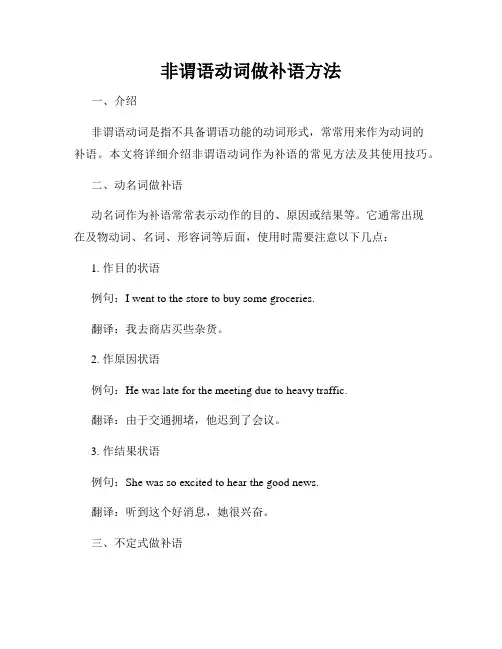
非谓语动词做补语方法一、介绍非谓语动词是指不具备谓语功能的动词形式,常常用来作为动词的补语。
本文将详细介绍非谓语动词作为补语的常见方法及其使用技巧。
二、动名词做补语动名词作为补语常常表示动作的目的、原因或结果等。
它通常出现在及物动词、名词、形容词等后面,使用时需要注意以下几点:1. 作目的状语例句:I went to the store to buy some groceries.翻译:我去商店买些杂货。
2. 作原因状语例句:He was late for the meeting due to heavy traffic.翻译:由于交通拥堵,他迟到了会议。
3. 作结果状语例句:She was so excited to hear the good news.翻译:听到这个好消息,她很兴奋。
三、不定式做补语不定式作为补语通常表示动作的目的、结果或方式等。
它通常出现在及物动词、名词、形容词等后面,并且可以根据句子结构的需要进行适当的变化。
1. 作目的状语例句:He stayed up all night to finish the report.翻译:为了完成报告,他整夜未眠。
2. 作结果状语例句:She worked hard to pass the exam.翻译:她努力学习以通过考试。
3. 作方式状语例句:The news shocked him to the extent that he couldn't speak.翻译:这个消息使他震惊得说不出话来。
四、现在分词做补语现在分词作为补语通常表示动作的主动、主观性和同时性。
它通常出现在及物动词、名词、形容词等后面,并且需要注意时态和人称的一致。
1. 作主动补语例句:I saw him standing at the bus stop.翻译:我看到他站在公交车站。
2. 作主观补语例句:She went to bed, feeling tired after a long day.翻译:经历了漫长的一天,她感到疲倦,上床睡觉了。
非谓语动词是指在句子中不是谓语的动词,主要包括不定式、动名词和分词(现在分词和过去分词)。
以下是三种非谓语动词的形式及示例:1,不定式(Infinitives):不定式由“to+动词原形”构成,在句子中可以作主语、宾语、表语、定语、状语等成分。
作主语:To learn English is important.(学英语很重要。
)作宾语:I want to go to the park.(我想去公园。
)作表语:My dream is to become a doctor.(我的梦想是成为一名医生。
)作定语:She has a lot of work to do.(她有很多工作要做。
)作状语:He ran to the station to catch the train.(他跑到车站去赶火车。
)2,动名词(Gerunds):动名词由“动词+ing”构成,在句子中可以作主语、宾语、表语、定语等成分。
作主语:Eating healthy food is important.(吃健康的食物很重要。
)作宾语:I enjoy playing football.(我喜欢踢足球。
)作表语:My hobby is reading.(我的爱好是阅读。
)作定语:She has a swimming pool in her backyard.(她的后院有一个游泳池。
)3,分词(Participles):分词分为现在分词和过去分词,现在分词由“动词+ing”构成,过去分词由“动词+ed”或“不规则变化”构成,在句子中可以作定语、状语、补语等成分。
作定语:The running man is my brother.(正在跑步的男人是我的哥哥。
)作状语:Walking in the park, she met her friend.(她在公园里散步时遇到了她的朋友。
)作补语:I saw him playing football on the playground.(我看到他在操场上踢足球。
非谓语作补语总结非谓语是指在句子中充当动词不定式、分词、动名词等形式的词语。
作为补语,非谓语可以用来修饰或补充句子中的名词、代词、形容词等成分。
在英语语法中,非谓语作补语的使用非常广泛,本文将对非谓语作补语的用法进行总结,并提供一些实例。
1. 动词不定式作补语动词不定式作补语常常用来表示目的、结果、原因等意义。
它通常与感官动词、使役动词、情态动词、使动动词等词语结合使用。
(1) 不定式作目的补语不定式作目的补语时,常用结构为“动词 + to + 动词不定式”。
•I bought some flowers to decorate the room. (我买了些花来装饰房间。
)•She went to the park to have a picnic. (她去公园野餐。
)(2) 不定式作结果补语不定式作结果补语时,常用结构为“动词 + 动词不定式”。
•I was surprised to see her there. (看到她在那儿,我很惊讶。
)•He is happy to have such a good opportunity. (他很高兴有这么好的机会。
)(3) 不定式作原因补语不定式作原因补语时,常用结构为“It + be + 形容词 + for + 人/物 + to + 动词不定式”。
•It is difficult for me to understand the complex problem. (对于我来说,理解这个复杂的问题很难。
)•It is important for us to take care of the environment. (对于我们来说,保护环境很重要。
)2. 分词作补语分词作补语可以用来表示时间、原因、方式等。
分词作补语的形式有现在分词和过去分词两种。
(1) 现在分词作补语现在分词作补语通常用来表示主动、进行或正在进行的动作。
•He came in, carrying a big bag. (他走进来,拿着一个大包。
非谓语动词的三种形式与用法非谓语动词是指在句子中充当其他成分而不担任谓语的动词形式。
一般来说,非谓语动词有三种形式:不定式、动名词和分词。
它们在句子中有着不同的用法和功能。
下面将详细介绍这三种非谓语动词的形式与用法。
一、不定式不定式是动词的一种形式,它可以作为名词、形容词或副词的补语,也可以作为谓语的补语。
不定式一般由“to + 动词原形”构成。
1. 作为名词的补语不定式可以作为名词的补语,起到与名词相同的作用。
例如:- My dream is to travel around the world.(我的梦想是环游世界。
)- I have a lot of work to do.(我有很多事情要做。
)2. 作为形容词的补语不定式可以作为形容词的补语,修饰名词或代词。
例如:- She has a book to read.(她有一本要读的书。
)- I am happy to see you.(见到你我很高兴。
)3. 作为副词的补语不定式可以作为副词的补语,修饰动词、形容词或副词。
例如:- He ran fast to catch the bus.(他快速地跑去赶公交车。
)- I woke up early to prepare for the exam.(我早早醒来准备考试。
)二、动名词动名词是一种以-ing 结尾的动词形式,它可以作为名词的主语、宾语、定语、表语等。
1. 作为名词的主语动名词可以作为句子的主语,表示某种行为或概念。
例如:- Swimming is good exercise.(游泳是一项好的锻炼。
)- Reading books is my favorite hobby.(阅读书籍是我最喜欢的爱好。
)2. 作为名词的宾语动名词可以作为某些动词的宾语,表示被动或完成的动作。
例如:- I enjoy swimming in the sea.(我喜欢在海里游泳。
)- She hates doing household chores.(她讨厌做家务活。
高中英语知识点归纳非谓语动词作补语高中英语知识点归纳:非谓语动词作补语非谓语动词是英语句子中的一类特殊动词形式,常常作为主语、宾语、定语、状语等句子成分的补充,用来丰富句子结构和意义。
在这篇文章中,我们将对高中英语中常见的非谓语动词作补语的用法进行归纳和总结。
一、不定式作补语1. 不定式作补语来表示目的不定式作补语常常用来表示主语或动词的目的、意图或目标。
常见的动词有:want, hope, wish, intend, learn, decide等。
例句:- I want to study abroad to improve my English.(我想出国学习以提高我的英语水平。
)- She hopes to become a doctor in the future.(她希望将来成为一名医生。
)2. 不定式作补语来表示结果不定式作补语还可以表示某个动作或状态的结果。
常见的动词有:cause, make, let等。
例句:- The loud noise made it difficult for us to concentrate on our work.(巨大的噪音使我们很难集中精力工作。
)- She didn't let her children play video games every day.(她不让孩子们每天玩电子游戏。
)3. 不定式作补语来表示方式或手段不定式作补语还可以表示一种方式或手段。
常见的动词有:learn, study, work, travel等。
例句:- He learned to swim at the age of five.(他五岁时学会了游泳。
)- They traveled to Africa to see wild animals.(他们去非洲看野生动物。
)二、动名词作补语1. 动名词作补语来表示行为或动作动名词作补语可以用来表示句子的主语或宾语所进行的行为或动作。
非谓语动词用法精讲分词作补语非谓语动词是英语中的一种特殊语法结构,它不像谓语动词那样可以作为句子的谓语,而是用来修饰名词、代词或者作为补语等。
非谓语动词的形式主要包括不定式、动名词和分词。
本文将对分词作为补语的用法进行详细的讲解。
分词是非谓语动词中最常见的形式之一。
在句子中,分词一般用来修饰名词或代词,并充当其后的定语或补语。
分词作补语可以有两种形式,分别为现在分词和过去分词。
首先,我们来讨论现在分词作补语的用法。
现在分词作补语通常表示主动或进行的动作,它和被修饰的名词或代词之间具有逻辑上的主动关系。
例如:1. I saw a girl standing at the bus stop.我看到一个站在公交车站的女孩。
2. The dog ran out of the house, barking loudly.狗朝外冲出房子,大声叫着。
在上面的例子中,分词“standing”和“barking”分别修饰名词“girl”和“dog”,并且表示这两个名词的动作正在进行或正在发生。
其次,我们来讨论过去分词作补语的用法。
过去分词作补语通常表示被动、完成或已经发生的动作,它和被修饰的名词或代词之间具有逻辑上的被动关系。
例如:1. She was amazed by the beautifully decorated Christmas tree.她被漂亮装饰的圣诞树惊叹不已。
2. The broken vase was thrown into the trash can.破碎的花瓶被扔进了垃圾桶。
在上面的例子中,分词“decorated”和“broken”分别修饰名词“Christmas tree”和“vase”,并且表示这两个名词已经完成了动作或者是被强调了其状态。
需要注意的是,分词作为补语时,其形式会根据所修饰名词或代词的数与格来进行相应的变化。
例如,当名词是单数时,现在分词通常以-ing结尾,而过去分词则常常以-ed或者-en结尾。
★解题思路
①解析句子结构,确定设空在句子中充当的功能(如状语、定语或宾补);
②找准相关动词的逻辑主语,确定该动词与逻辑主语是什么关系(主动还是被动);
③搜索句子中相关的时间信息,确定非谓语动词的恰当形式;
④将该选项置入空中,看是否能够做到字从意顺,或是否能传达有效信息、完成交际任务。
★分词、不定式作宾补用法要点
一、分词、不定式作宾语补足语
.....的区别
1.感官动词see, watch, observe, look at, hear, listen to, notice 等和使役动词have 后面的宾补有三种形式,即原形动词(不带to 的不定式)、现在分词和过去分词。
现在分词表主动或正在进行,过去分词表被动或完成,动词原形表主动和完成。
如:
I heard her sing an English song just now.
刚才我听见她唱了一首英文歌。
2.leave 后接三种形式作宾补时,其中的leave 保留了原来之义“留下”,但表达的确切之义应是“使……处于某种状态”。
①leave sb. doing sth. 让某人一直做某事(宾语和宾补之间是主谓关系,表示动作正在进行。
)
②leave sth. undone 留下某事未做(宾语和宾补之间是动宾关系,表示被动和完成,一般以undone, unfinished, unsettled, untouched 为多)
③leave sb. to do sth. 留下某人做某事
④leave sth. to be done 留下某事要做(不定式表示将来的动作。
)
如:It’s wrong of you to leave the machine running.
你让机器一直开着是不对的。
(主动,正在进行)
The guests left most of the dishes untouched, because they didn’t taste delicious.
客人们没有动大部分菜,因为它们尝起来不可口。
(被动,完成)
He left, leaving me to do all the rest work.
他走了,留下我一人去做剩余的工所有工作。
(主动,将来)
We hurriedly ended our meeting, leaving many problems to be settled.
我们匆匆忙忙地结束了会议,留下了很多问题等待解决。
(被动,将来)
3.have, get 后接三种形式作宾补时,其中have, get 表示“使、让、叫”之意。
①have sth. done = get sth. done “使/让某事由别人去做”(叫/让某人做某事)。
如
I’ll have /get my bike repaired tomorrow.
此外,have sth. done 还表示“使遭受……”之意。
如
Tom had his leg broken while playing football.
Mr. Smith had his house broken into while he was away on holiday.
② have sb. / sth. doing 使/让某人/物持续地做某事(现在分词表示主动,正在进行)
get sb. / sth. doing 使某人/物开始行动起来
如:The peasants had the tractor working day and night at the harvest time.
农忙时,农民们让拖拉机夜以继日地干活。
如:Mother had me go to the shop and buy some salt.
I can’t get him to stop smoking. He won’t listen to me.
二、下列动词后跟带to的不定式作补语
..:
advise, allow, ask, beg, cause, encourage, expect, forbid, force, get, intend, invite, like, love, order, persuade, prefer, require, teach, tell, want, warn, wish, 等。
如:
①An army spokesman stressed that all the soldiers had been ordered to issue clear warning before firing any shots.
② The teacher asked us not to make so much noise.
③ The flu is believed to be caused by viruses that like to reproduce in the cells inside the human nose and throat.
三、不定式、现在分词作宾补
..小窍门
下列动词后在主动语态中用不带to 的不定式作补语,但在被动语态中要加上to:
它们是“吾看三室两厅一感觉”——5看(look at, see, watch, notice, observe);3使(make, let, have);2听(listen to, hear);1感觉(fell)。
以上动词还可用现在分词作宾语补足语(5+3+2+1-2+4):即以上动词除let, make 外都可以用现在分词作宾语补足语,此外find, catch, keep, have 也可以用现在分词作宾语补足语。
如:At that time, I found him crying in the street.
He was caught stealing. I’m sorry to have kept y ou waiting for such a long time.
The missing boys were last seen playing near the river.。